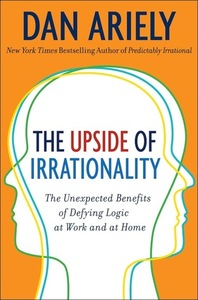Take a photo of a barcode or cover
59 reviews for:
The Upside of Irrationality: The Unexpected Benefits of Defying Logic at Work and at Home
Dan Ariely
59 reviews for:
The Upside of Irrationality: The Unexpected Benefits of Defying Logic at Work and at Home
Dan Ariely
An interesting, entertaining look at the irrationality of human nature. I found it to be more of a discussion of the irrationality itself rather than its benefits, but it was a fun, informative read nonetheless.
informative
slow-paced
I love Dan's writing voice, and I'm always interested in his brand of social science.
A quick read, The Upside of Irrationality isn't too substantial if you've already read Predictably Irrational. Many examples are recycled and I felt unsure if this was the same book I had already read. It's still enjoyable in that behavioral economics style of feeling that you've learned something without diving into an overly dense book, and Ariely does have a lot of intelligent commentary. If this wasn't one of the only unread works downloaded onto my iBooks and I wasn't stuck on a 9 hour flight, I probably wouldn't have set aside time for this book.
This is the first non fiction book I read that includes lots of personal stories and I love it. The author's severe injuries have given him insight to lots of his research. As a psychology student, I'm very intrigued with the author's ingenious methods to test his hypothesis. I'll definitely read his research paper in detail. Some ideas of the the book I've heard before from the author's speech, like the importance of meaning at work and the IKEA effect. Some are totally new to me, like self herding. I thoroughly enjoyed reading about human's irrational side.
Not quite as good as the first book. But as it's on the same topic, it's not too surprising that all the good stuff went into the first one. Maybe if I read this one first? Since it was still interesting.
I do plan on reading more of his books.
I do plan on reading more of his books.
Not quite as as good as predictable irrational but interesting reading none the less
Although I think Ariely paints a deliberately narrow view of rationality (his thesis ends up being that we should experiment more and use our intuitions less, which is almost the exact definition of rationality), he is very persuasive that it is necessary to understand the seemingly capricious and often counterintuitive preferences people have in everyday situations. This ends up being a powerful endorsement of behavioral economics, which for a period in my life I considered pursuing, and a criticism of a school of economics that takes up and inexplicably endorses aforementioned "narrow" rationality, and for that reason I recommend it to people who have perhaps a cynical view of economics.



